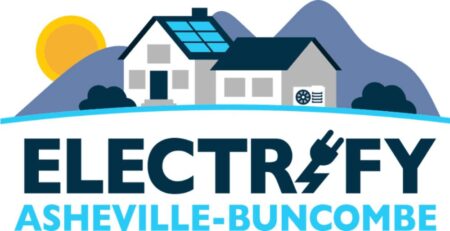Happening Now
 Electrify Asheville-Buncombe County is a pilot program supporting home energy efficiency and electrification upgrades as one way to move toward the City supported goal of powering Buncombe County with 100% renewable energy by 2042. The project is a collaboration between the City of Asheville, Buncombe County, Bright Spaces, and North Carolina’s Clean Energy Fund (NCCEF), and offers residents support along the journey to cleaner and more affordable energy via electrification.
Electrify Asheville-Buncombe County is a pilot program supporting home energy efficiency and electrification upgrades as one way to move toward the City supported goal of powering Buncombe County with 100% renewable energy by 2042. The project is a collaboration between the City of Asheville, Buncombe County, Bright Spaces, and North Carolina’s Clean Energy Fund (NCCEF), and offers residents support along the journey to cleaner and more affordable energy via electrification.
The project includes an online platform and marketplace where you can sign up and generate an energy profile to receive personalized suggestions and access technical assistance to pursue energy savings. Beyond connecting local customers with vetted contractors, the marketplace offers information and opportunities to save money through bulk purchase offerings, rebates and incentives. Additionally, the Home Energy Navigator program provides free sessions to help participants plan, prioritize, and make informed upgrade decisions. Financing information is also available via the platform and financing navigation support is available through NCCEF.
Background
The City of Asheville has a goal to power all municipal operations with renewable energy by 2030 and to support Buncombe County’s community-wide goal of the entire county to be powered by renewable energy by 2042. In 2007 City Council passed a resolution to reduce carbon emissions from City Operations by 2% annually until an 80% overall reduction. That rate of reductions was doubled in 2011 following significant energy savings from switching to LED lighting for street lights. The Energy Innovation Task Force (EITF) was convened in April 2016 and replaced with the Blue Horizons Project (BHP) in March 2020, after achieving its primary goals, including delaying the construction of a proposed natural gas peaker plant.
The 2019 Moving to 100 Percent Report highlighted pathways to transition the County and City buildings to a renewable electricity supply and underscored that the community-wide goal cannot be achieved through local government action alone.
In 2022 a collaborative effort between BHP, Green Built Alliance and SolarCrowdsource launched a successful solarize campaign in Asheville Buncombe resulting in 1,442 kWs of residential solar, 28 kWs of commercial solar, and 126 kWs of Battery storage installations.
Building on the success of the solarize campaign, another round of collaboration continues to drive energy efficiency in the City and County while positioning our community to take advantage of the historic influx of federal incentives from the Inflation Reduction Act, and financing through the North Carolina Clean Energy Fund in collaboration with Self Help Credit Union.
Timeline
- April 2007: City Council passes 2% carbon emissions reduction resolution
- April 2011: City Council passes 4% carbon emissions reduction resolution
- April 2016: Energy Innovation Task Force (EITF) Convened
- 2019: COA and Buncombe County agreement to install 45 Solar projects
- Jan 2020: Natural gas peaker plant construction delayed
- March 2020: EITF replaced with Blue Horizons Project (BHP)
- April – December 2021: Solarize campaign
- April 2024: Electrify ABC platform launch
- Feb 2025: Home Energy Navigator Program launch
Supporting Documents
- 2007 Carbon Reduction Establishing Goal
- 2011 Increase of Carbon Reduction Goal
- Clean Energy Economy
- Community Clean Energy Policy
- 100% Renewable Energy Goal
Contact Information
Kiera Bulan, Sustainability Manager
(828) 620-0664

